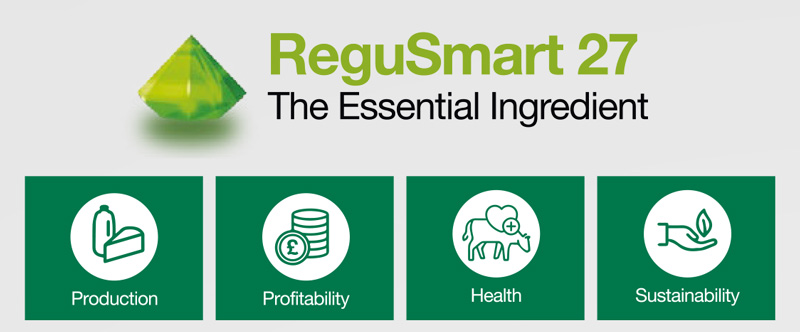The global molasses market remains firm due to a number of factors:
- The issues around the Red Sea and Suez Canal are forcing vessels to go via the Cape adding time, costs and insurance premiums to shipments from India/ Pakistan/Asia
- Low water levels in the Panama Canal forcing vessels around the Cape again adding time, cost and insurance premiums
- Urea market has eased over the last few months
- Strong global demand for molasses keeping cane molasses prices high
- Currency has changed little since winter 2023-24 resulting in minimal price effects
We have seen strong demand for molasses based liquid feeds on farm over the winter as livestock farmers have sought to get the most from poor quality silage and adapt rations to improve margins on the back of the milk price falling. We expect to see the same pattern through the summer as farmers work with their nutritionists to optimise rumen function and drive production whilst lowering input costs.
Early indications from Trouw’s GrassWatch Report are that fibre levels are higher than expected which can, if not supplemented properly lead to reduced digestion, intakes and feed utilisation. It’s important to remember that no feed ingredient on its own provides the solution to an effective ruminant ration… it’s about building a well-balanced ration that provides the rumen bugs and the animal with the right balance of nutrients.
Cereals look good value and optimising their use is going to be important this summer but overfeeding starch can be a problem. Research has shown that too much starch in a diet can quickly lead to acidosis impacting on rumen function and livestock performance. However, by including a molasses based liquid feed alongside cereal feeding this can result in a much lower risk of acidosis.
Research has shown that by replacing a proportion of starch with sugar in a ration can significantly reduce the amount of time the rumen is in acidotic conditions. One trial looked at cows on a ration with 2.6% sugar and another at 8%, the cows on the higher sugar diet spent almost half the amount of time in acidotic conditions compared to the cows on the low sugar diet which recorded over 6 hours at a pH of less than 5.8!
Urea prices have eased a little over the last few months resulting in our high protein Regulated Release offering even better value this summer and providing an excellent option to balance high maize and cereal diets.
Spring Grass and Turnout
As the cold and wet weather continues across the country the prospects for turnout are not encouraging, putting pressure on silage stocks. An effective way to help stretch out these stocks is to incorporate a proportion of straw in replacement of silage alongside a molasses based liquid feed into the ration.
ED&F Man carried out research in collaboration with Agri-Epi Centre at their South West Dairy Development Centre alongside Kingshay Dairy consultants to demonstrate that including a proportion of straw and Regumix, a palatable high energy and protein molasses based liquid feed, in replacement of grass silage within a TMR allows production to be maintained while preserving silage stocks. 7.5kg of grass silage was replaced with 1.5kg wheat straw and 1.5kg Regumix.
Over a six-week period there was no difference in yield between cows on both diets with the cows on the straw:molasses alternative milking as well as cows on the traditional buffer feed but, with slightly better compositional quality. There was also no difference in body condition between the two groups. The group with the straw:molasses alternative meant that silage was being saved for potential additional days of winter housing due to weather and late turnout.
Molasses based liquid feeds play a crucial role in maintaining optimum rumen function when feeding straw which is not a highly nutritious or palatable feed.
Molasses based liquid feeds contain highly rumen fermentable sugars which help to kick-start the rumen microbial populations to improve fibre digestion and microbial protein production helping to utilise straw more effectively. The addition of a protein molasses based liquid feed over straw bales also helps to improve the palatability, digestibility and intakes.
Following turnout and grazing it will be important to monitor the herd performance. Early reports from Trouw’s pre-cut grass service have shown that grass is currently analysing high in fibre, with average NDF over 40%, and low in sugar. With the average below 10%.
This is indicating that the grass is not very digestible and will be significantly unbalanced in terms of protein to carbohydrate ratio. The key to effective grazing this season will be the implementation of a buffer feed to support milk yield and quality. As above, the inclusion of molasses within a buffer feed can help drive efficiency from grazing, support milk yield and butterfats.
Although it seems early to start thinking about winter 2024/25, with the climate leading to milder winters and wetter springs, a potential increase in the number of winter housing days needs to be budgeted for when planning forage stocks. The saving of 7.5kg of silage per cow per day within the summer buffer feed, as carried out in the trial, can be expanded for a 200-cow herd over a typical 18-week period, totalling a potential silage saving of almost 200 tonnes. This silage is then available to increase the silage fed per cow per day over the winter feeding period, or ensure stocks are sufficient for a longer housed period.
It is important that when implementing straw-based diets there is good access to a plentiful water supply, any major ration changes are implemented gradually, and additional mineral supplementation may be required.
ReguSmart 27: Precision Nutrition

ReguSmart 27 is the latest high dry matter, protein liquid feed with 53% sugars, 27% crude protein alongside 9.25g/kg of digestible methionine and is formulated to be fed at 1.4kg/head/day.
Around 85% of UK dairy diets are deficient in the amino acid methionine. Correct supplementation can have a positive effect on cow performance and efficiency. Molasses based liquid feeds are well known for improving dry matter intakes, milk constituents, fibre digestion and rumen function. Combining these benefits with a proven source of methionine in the form of MetaSmart has created a practical and easy way to deliver the methionine needed to help cows perform to their potential.
For those currently on a Regumix blend, a swap to ReguSmart 27 will increase the cost per cow per day by 17p. However, when this swap is modelled on the Adisseo rationing software there is a predicted increase of 0.25kg milk yield, 0.09% protein and 0.11% fat, which depending on the milk buyer can have a benefit of 38p/cow/day indicating a 2:1 ROI!
The graph below shows how this is achieved, the red line indicates the methionine requirement for a 44L/d milk yield. The Regumix diet shown by the green bar shows this requirement is not being met. However, the ReguSmart 27 diet shown by the grey bar allows methionine requirements allowing the increase in milk yield and quality.
By reformulating the diet to remove excess crude protein and enhance precision feeding, this can lead to a diet cost saving of 16pc/d and an increase in nitrogen efficency.
For more information on this product please contact your local commercial manager.
Robomol: Next Generation feeding
Robomol is a molasses based liquid feed specifically designed to get the most from robotic milking, formulated to ensure optimal flowability in the robot.
The high sugar levels and added flavouring encourages cow visits to the robot which help drive production on farm. Robomol is a highly palatable, high energy liquid with 14.1MJ/kgDM and can be fed at up to 1kg/cow/ day. With todays high prices for MPG (monopropylene glycol) on farm, RoboMol can offer a cost-effective and palatable alternative liquid source in robots.
RoboMol is available nationally in 1000 kilo IBC’s, for further information the technical data sheet is available on our website or speak to your local commercial manager.
ED&F Man Agronomy
ED&F Man Agronomy are excited to launch a NEW range of Crop Nutrition products developed for foliar and soil application. Based on sustainable Bonsucro certified molasses, together with a range of natural and environmentally friendly ingredients, including seaweed and fulvic acid options, will help drive cost effective crop production and support farmers in their move towards a lower nitrogen more sustainable future and help reverse the continued degradation of soil carbon and organic matter.
ED&F Man’s Crop Nutrition range has been developed to improve soil fertility and drive crop growth. Sustainable cane molasses is a natural source of both carbon and energy and when blended with additional liquid nutrient packages can impact each layer of the soil profile, including the crop, organic, topsoil and subsoil.
The four products are formulated for specific situations and requirements, allowing a tailored programme to be developed to optimise crop establishment.
Black Label: A high carbon and sugar product which makes it particularly effective for pairing with foliar nitrogen applications. This helps to mitigate against both sun and frost scorch and improve the metabolism of nitrates, which increases the efficiency of fertiliser absorption.
Gold Label: A blend of sustainable cane molasses and fermentation co-products from the sugar industry.
Contains high levels of carbon and amino acids, beneficial to soil health and aiding germination and early establishment and help facilitate the conversion of inorganic nitrogen into amino acids, the building blocks for protein synthesis.
Blue Label: A blend of sustainable cane molasses, fermented sugar co-products, and a concentrated Ascophyllum nodosum seaweed extract. Seaweed provides a large boost of nutrients to the blend as it is particularly high in amino acids, enzymes, polysaccharides, fatty acids, organic glutamine, and bioactive peptides. Formulated to enhance the plants own biochemistry boosting efficiency and growth mechanisms in the developing crop. The sugar from cane molasses promotes a more vigorous carbohydrate development in the plant aiding in a healthier, stronger cell structure which is less prone to biological and chemical stresses and disease.
Red Label: Red Label is a blend of high sugar sustainable cane molasses, fermentation products and a humic and fulvic acid. The ideal accompaniment to liquid fertiliser and crop protection spray applications. Stimulates cationic exchange capacity giving it an ability to effectively form chemical bonds which support nutrient uptake and elemental trans-location into plant cells, and aids chemical pathways in soil and root systems.
The concept has been developed over the last 10 years and has been shown to be beneficial for cereals, root crops, salad crops and potatoes as well as grass and maize crops. Crop yields are increased through more efficient foliar uptake and absorption of nutrients.
In independent trials, the use of one of ED&F Man’s Agronomy products increased the yield of carrots by more than 3%.

